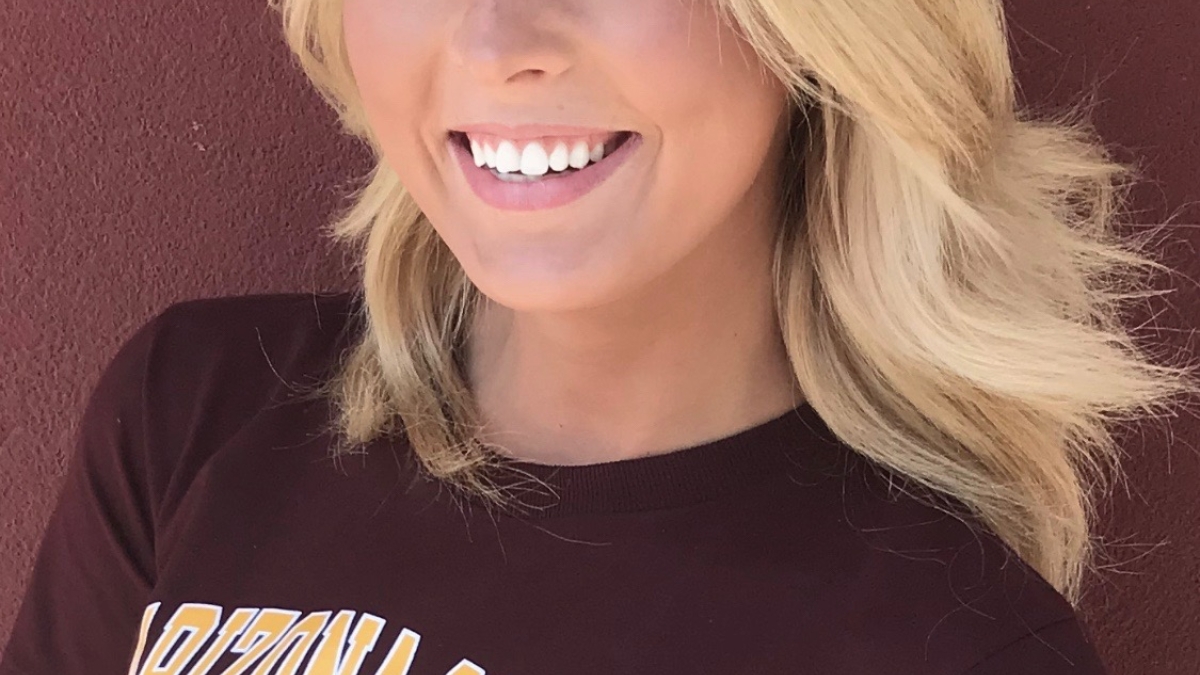Chimpanzee research helped anthropology 'click' for ASU graduate

Savannah Troha
Editor's note: This story is part of a series of profiles of notable spring 2020 graduates.
Anthropology clicked for Savannah Troha when she became involved with the Gombe Chimpanzee Research Project.
She fondly describes spending an entire semester transcribing data and searching field notes for mention of a certain orphaned chimpanzee. Co-director of the Gombe Chimpanzee Database, Associate Professor Ian Gilby, warned Troha it might be a little dull, but she loved it, recalling it was like reading a story.
Troha was looking for mentions of Pax, a small male who was horrifically injured at a young age and then lost his mother shortly after. Many chimpanzees would not have survived, but Pax did. He went on to become a thriving member of the troop, and even cared for younger orphaned chimpanzees. He was interesting to Troha because he didn’t fit the behavioral mold of most male chimpanzees.
Some of the field notes she reviewed were written in Swahili. While she didn’t know the language, she began looking for codes indicating specific chimpanzees. She was enthralled with the handwritten notes, and when areas were underlined or there were additional notes scribbled in the margins, she tried translating Swahili into English just to see what the researchers were talking about.
“Even at its most mundane or ridiculous I knew that there was nothing else I wanted to do,” she said. “Anthropology and primate behavioral ecology was ‘it’ for me!”
Her time spent researching as an undergraduate student spurred an independent research project, which she intends to pursue this fall when she returns to begin a doctoral degree in anthropology. While combing through thousands of pages of field research, she noticed that occasionally when two male chimpanzees had a physical altercation, they would be observed acting affectionately toward each other afterward. She will continue to work with Gilby to research conflict resolution behavior.
One of the reasons Troha finds primate research so interesting because it can spur us to think about relationships in general and how they work. Troha is looking forward to visiting Gombe, Nigeria, during her continued studies.
Troha, from Lake in the Hills, Illinois, is graduating with a Bachelor of Arts in anthropology from the School of Human Evolution and Social Change. She received funding from Studio Mechanics Local 476 Legal and Educational Assistance Fund.
She shared more about her studies at ASU.
Answers have been edited for length and clarity.
Question: What are your plans after graduation?
Answer: I’m a lifelong Sun Devil! In the fall I will begin my journey as a graduate student in the School of Human Evolution and Social Change and start working towards my PhD in anthropology.
Q: Why did you choose ASU?
A: I chose to stay at ASU because I see the brilliance in the faculty and student body and the importance of the work being done here. I think I have barely scratched the surface and still have so much more to learn from my time at ASU and I’m more excited than ever.
Q: What’s the best piece of advice you’d give to those still in school?
A: My advice to those in school is to find a field that you truly love. Even if it’s not your major or something to hang your future on, find something that makes you excited to learn and explore that. And if it is your major or something to hang your future on, be grateful and try to never lose that excitement.
Q: If someone gave you $40 million to solve one problem on our planet, what would you tackle?
A: I would use the money to support female education. The education of women and girls is so important, and I wish every girl had the same opportunities and support that I have had. Melinda Gates once said, “When we invest in women and girls, we are investing in the people who invest in everyone else.” With that in mind, initiatives that support female education support a better world for everyone and create opportunities for women to tackle other important issues.
More Arts, humanities and education

ASU graduate education programs are again ranked among best
Arizona State University’s Mary Lou Fulton College for Teaching and Learning Innovation continues to be one of the best…
ASU FIDM students to see their designs on the runway at Uncertainty Fashion Showcase
Nola Hill is perfecting every stitch of her fashion design collection, which she started conceptualizing last summer.She is among…

ASU+GSV Summit brings experts together to discuss innovation in education
This week, Arizona State University President Michael Crow and other university leadership joined education and learning experts…

